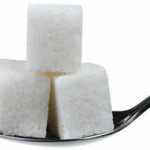Can Too Much Sugar Cause High Blood Pressure?
It’s clear that excessive consumption of salt can cause high blood pressure (hypertension). Even dietary salt factor is one of the most concerns in DASH diet (Dietary Approaches to Stop Hypertension). How about ‘too much sugar’? Does it cause hypertension?
As well we know, generally diet high in sugar is linked with the high risk of type-2 diabetes since it can cause some risk factors of type-2 diabetes such as obesity. It also can be bad for blood sugar control in people with diabetes (either type-1 or type-2 diabetes).
Excessive consumption of sugar in your diet may not directly cause high blood pressure. But overtime, it can increase your chance of getting elevated blood pressure higher than normal.
High accumulation of sugar (glucose) in the bloodstream can increase your risk of getting ‘high cholesterol’ and developing ‘chronic kidneys failure’. And both chronic conditions can have contribution to cause hypertension.
So, if you seriously want to keep the level of your blood pressure (BP) normal in long term, it’s important to avoid eating too much sugar, particularly true if you also have diabetes. Uncontrolled blood sugar and raised BP in diabetic people can lead to other serious complications.
 In general, occasionally getting too much sugar in the diet for healthy people (those who don’t have diabetes) is no problem.
In general, occasionally getting too much sugar in the diet for healthy people (those who don’t have diabetes) is no problem.
But remember, poor diet is one of significant risk factors that can increase the risk of developing type-2 diabetes. Therefore to keep safe and to improve your insulin sensitivity in long term, it’s much better to get dietary sugar moderately – make sure it meets to your body needs!
High cholesterol can be a chronic condition that is also one of risk factors of hypertension. In other words, if you have high cholesterol, you risk of developing high blood pressure is higher than other who don’t.
In fact, both high cholesterol and hypertension is pretty common to be found together. Generally, both health problems can affect each other.
The amounts of glucose in the bloodstream are controlled by special hormone called insulin. This hormone is produced in the pancreas.
After eating, the blood sugar usually reaches its peak level. In this period, pancreas will release more insulin to help reduce glucose in the blood. The glucose in the blood then will be converted into energy or stored as fat cells – depending on the body needs.
As you age, your insulin sensitivity decreases. Therefore, your risk of type-2 diabetes increases as you get older (age is one of unchangeable risk factors of type-2 diabetes).
The decreased insulin sensitivity can run faster if you have some bad habits in your life such as bad diet (such as too much glucose in your diet ‘higher than your daily requirement’ and getting your meals irregularly) and poor in exercise (regular exercise can improve your insulin sensitivity in long term).
More episodes of getting excessive glucose in your blood mean higher chance for the cholesterol deposits to stay longer in the bloodstream.
Glucose can attach to Low Density Lipoprotein (LDL – familiar known as ‘bad cholesterol’). And bad cholesterol that is coated with sugar /glucose can stay in the blood longer. As a result, overtime this can increase the amounts of LDL in the bloodstream and your bad cholesterol level increases.
In addition, diabetic people are more likely to have lower level of HDL (High Density Lipoprotein – considered as ‘good cholesterol’) and higher level of LDL. Generally, they have higher rates of having cholesterol abnormalities than others who don’t have diabetes, according to ADA (the American Diabetes Association).
Chronic condition such as high cholesterol can have contribution to raise your systolic and diastolic pressure – as noted before.
Systolic is the top number of your blood pressure because it describes the force of blood against the artery walls when your heart is contracting or beating. And diastolic pressure, it points to the pressure inside your arteries between beats (when your heart at rest) – therefore the number of diastolic pressure is usually lower than systolic pressure.
Higher amounts of LDL are very bad for your cardiovascular system. Over time, they can lead to hardening-plague artery.
More bad cholesterol in the bloodstreams means higher risk of developing more plagues that can obstruct the flow of blood through blood vessels.
These plagues can cause a condition called atherosclerosis. Atherosclerosis can increase vascular resistance which means your heart will work harder in pumping the blood and your blood pressure is easier to increase.
Excessive sugar /glucose in your bloodstream can increase your risk of developing chronic kidney failure, and this chronic condition can cause high blood pressure (renal hypertension)!
Your kidneys have crucial function to filter wastes and excessive fluid from your body. They also are so important to regulate your BP.
Kidneys produce several important hormones for your body, these include:
- Active vitamin D. It is needed by your body to help manage calcium uptake. Overall, it is also important to help improve the health and strength of your bones.
- Erythropoietin! It helps stimulate the red blood cells production.
- And renin! It is special hormone produced and released by kidneys to help manage your blood pressure.
So, it’s clear that your kidneys are vital for your blood pressure.
But how does too much glucose /sugar in your blood can lead to chronic kidney failure? Keep reading!
Well … While kidneys are important for your healthy systolic and diastolic pressure, hypertension itself also can significantly affect the health of your kidneys.



